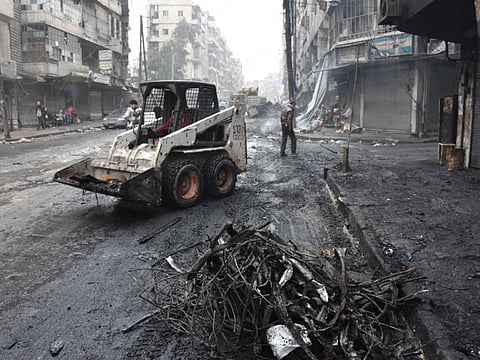Conditions still murky for peace in Syria
Opposition lacks the clout to bring its demands for a solution with even a modicum of justice to the table

After weeks of heavy bombardment, the armed Syrian opposition factions agreed to a Russian-Turkish agreement to evacuate the eastern part of the city of Aleppo, which they had controlled for more than four years. Immediately after the rout of the opposition, Russia called for a trilateral meeting in Moscow, bringing together the foreign and defence ministers of Iran and Turkey with their Russian counterparts. Russia leaned on Tehran to accept the “Moscow Declaration” which, Russian Foreign Minister Sergei Lavrov claimed, provides a detailed roadmap to end the Syrian crisis.
With Aleppo now firmly in its grip, Moscow was quick to make the most of developments on the ground as well as to utilise the near-total absence of the United States, which has been in the midst of a transition of power since the November 8 presidential election. Even the assassination of Moscow’s ambassador to Turkey did not stall Russia’s efforts to draw its own map to end the Syrian conflict.
The talks, which concluded in Moscow on December 20 with the adoption of the “Moscow Declaration”, explored the political future of Syria. One of the tenets of the Declaration was an explicit statement that there could be no military solution to the Syrian conflict.
The text also acknowledges the involvement of opposition groups — with the exception of Al Nusra Front and Daesh (the self-proclaimed Islamic State of Iraq and the Levant) — into a political dialogue with the Syrian regime over the future of Syria. Today, Moscow is working to expand the ceasefire that took hold in Aleppo across the rest of Syria, and to prepare the ground for an upcoming political process.
Although Moscow sought to depict the discussions, which it hosted, as amicable and as having ended in a consensus, stark differences between the parties were clearly evident. One specific bone of contention was the interpretation of a text in United Nations Security Council Resolution 2254 (December 18, 2015), which stipulated an end to supplies of armed groups by international parties.
Sentiment at odds
While the Turkish foreign minister stressed the importance that such an understanding also cover armed groups aligned with the Syrian regime, such as the Lebanese Hezbollah, his Iranian counterpart countered that the text of UN resolution only covers groups designated as terrorist organisations by international law — a clear reference to Daesh and the Al Nusra Front. The Iranian defence minister also took time after the meeting in Moscow to praise the results of Iranian-Russian military cooperation in Aleppo — a sentiment clearly at odds with the spirit of the Moscow Declaration, with its disavowal of a military solution to the Syrian crisis.
Indeed, Russia will now attempt to leverage the Moscow Declaration to translate its military prowess, which was on display in Aleppo, into diplomatic influence which can be used to conclude a peace agreement. Russian efforts to present some level of optimism about this latest agreement notwithstanding, the conditions necessary for peace to take hold in Syria are still absent.
The same set of circumstances which led to the failure of the Geneva 2 and Geneva 3 communiques continue to hold. Specifically, the questions which remain to be resolved include: How can there be a true in Syria if Russia and Iran continue to insist that Syrian President Bashar Al Assad must remain in power? How exactly will a resolution be found in Syria if there is no Arab role in that country? What role will the US play, given that regional powers have so far appeared able to seize the initiative and marginalise Washington?
Lack of any satisfactory answers
Finally, how will the Syrian armed opposition react when faced with a rhetoric which sees only terrorism as the problem but which neglects the fundamental causes which gave rise to that terrorism?
Given the lack of any satisfactory answers to these questions, the conflict in Syria will likely persist until the circumstances which could see it end are satisfied. The three countries which signed the Moscow Declaration do indeed have the power to arrive at a ceasefire and expand it further out from Aleppo to cover the rest of the country. Russia, too, may be tempted to move away from Iran in Syria in order to become a mediator and help see the conflict end.
At the end of the day, Moscow cannot continue to fight forever and is keen for some kind of resolution to the Syrian crisis.
Meanwhile, the armed Syrian opposition lacks the clout to bring its demands for a solution with even a modicum of justice to the table. Such a demand will require the ability to plan strategically and the discipline to accept and implement common aims. The Syrian opposition would, then, need to persuade the world not only of the brutality of the Syrian regime, but that an alternative authority capable of running the country and upholding its territorial integrity and stability exists. Thus far, they have failed to demonstrate this.
Dr Marwan Kabalan is a Syrian academic and writer.



